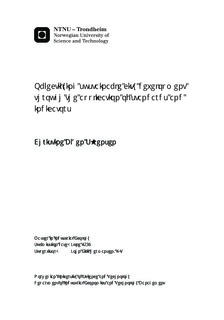Objectifying sustainable city development through the application of standards and indicators
Master thesis
Permanent lenke
http://hdl.handle.net/11250/2352804Utgivelsesdato
2014Metadata
Vis full innførselSamlinger
Sammendrag
The initial assumption was that there exist connections between the development of standards and indicators that enables the assessment of abstract concepts and systems that is enabled by an objectification process. Systems thinking can be seen as a process of objectification, those who make, apply the standards, as well as the standards themselves, can be viewed as objectification. The issues of sustainability and solving them for the attempt to make sustainable transitions in current and future sustainable city developments may benefit from understanding the connection between systems thinking, objectification and standards.
The building of such an understanding through reviewing general issues of sustainability, measurements and sustainable city initiatives pointed to by research, have been concerned with how to enable the making of an understanding of how objectification can be seen as part of knowledge production and that is traceable in both the standard creation process as well as in how we plan for sustainable city development. More specifically, it attempted to explore if there do exist connection between the development of standards and indicators that enables the assessment of abstract concepts and systems that is enabled by an objectification process. For understanding these connections, models based on systems thinking have been developed. This conceptual knowledge system have been developed in order to make connections between standards, objectification and sustainable cities development, as well as to act as a frame of reference to the thinking process, but also to specifically attempting to describe these fuzzy connections. Still, such an inquiry can be applied by others seeking to understand the connections between knowledge development, systems theory, objectification, sustainable cities development, standards and indicators, or more generally for understanding abstract concepts and systems. The conclusion of this paper is that there exist connections between the development of standards and indicators that enables the assessment of abstract concepts and systems that is enabled by an objectification process. But, such a process is nor clearly evident for researchers or practitioners, nor is objectification used in the way as attempted to in this paper. Still, understanding these connections; the understanding through investigation the objectification process at play in sustainable city initiatives, may make the fuzziness of sustainable practices more evident.
